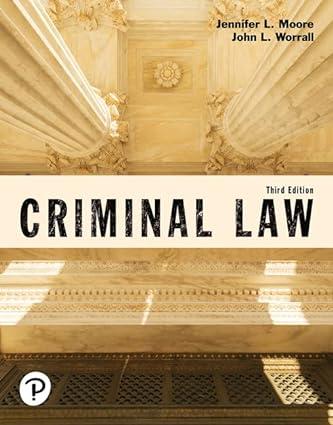Thomas Harrison was convicted of driving while intoxicated in the District Court of Bernalillo County. The New
Question:
Thomas Harrison was convicted of driving while intoxicated in the District Court of Bernalillo County. The New Mexico Court of Appeals affirmed the conviction.
Defendant and a friend, Jude Mari (Mari), were at a mutual friend’s home. Upon preparing to leave the residence, Mari noticed that Defendant was intoxicated and offered to drive for him. They got into Defendant’s car. Mari drove and Defendant was a passenger. Mari drove the vehicle for a short distance when the car stalled and would not restart. Mari testified that he steered the vehicle as close as he could to the curb and parked it. Mari further testified that he then took the keys out of the ignition, placed them under the seat, and placed bricks under the front and back tires of the vehicle.
Mari instructed Defendant not to leave the vehicle and then left in search of help.
. . . (Officer) Longobardi testified that, upon approaching the vehicle, he saw Defendant passed out behind the steering wheel of the car. He further testified that the key was in the ignition, the ignition was turned on, the transmission was in drive, and Defendant had his foot on the brake. The officer aroused Defendant, who spoke to Longobardi in a slurred manner. Longobardi smelled alcohol on Defendant’s breath and noticed that Defendant had red, bloodshot eyes. On cross-examination, the officer admitted that he did not inquire of Defendant whether he had driven the vehicle to that location, or why the car was sitting there.
. . . Defendant was transported to the Bernalillo County Detention Center where he submitted to breath tests which produced readings of .17 and .15. In the metropolitan court proceedings, Defendant was found guilty of DWI.
. . . Defendant next argues that there was insufficient evidence to support his conviction because the State failed to prove that he intended to drive the car. Although the parties appear to use specific intent and general intent interchangeably, general intent is all that is at issue in this case. DWI does not require an intent to do a further act or achieve a further consequence, such as is ordinarily required in specific intent crimes. Defendant argues that since he was not conscious of his wrongdoing, he cannot have the intent he says is required to sustain a DWI conviction. We disagree.
New Mexico’s DWI statute states in part that “[i]t is unlawful for any person who is under the influence of intoxicating liquor to drive any vehicle within this state,” and further, “[i]t is unlawful for any person who has one-tenth of one percent or more by weight of alcohol in his blood to drive any vehicle within this state.” Section 66-8-102(A), (C). Our primary focus is to give effect to the intention of the legislature. In doing so, we examine the language used in the relevant statute. Section 66-8-102 makes absolutely no reference whatsoever to a required intent on the part of an accused. Rather, the statute clearly provides that the only thing necessary to convict a person of DWI is proof that the defendant was driving a vehicle either under the influence of intoxicating liquor or while he had a certain percentage of alcohol in his blood.
A strict liability crime is one which imposes a criminal sanction for an unlawful act without requiring a showing of criminal intent. The legislature may forbid the doing of an act and make its commission criminal without regard to the intent of the wrongdoer. The rationale for making an act criminal without regard to the perpetrator’s intent is that the public interest is so compelling, or the potential harm so great, that the public interest must override the individual’s interests. The standard for determining whether a statute is a strict liability statute involves ascertaining whether there is a clear legislative intent that the act does not require any degree of mens rea.
Obviously, the public’s interest in deterring individuals from driving while intoxicated is compelling. This is due to the dangers of the practice, not only to those who operate motor vehicles while under the influence, but also to those innocent individuals who are injured or killed as a result of DWI accidents. The fact that innocent individuals are oftentimes injured or killed, and their families and loved ones made to suffer, makes the potential harm from DWI much greater than if only the irresponsible person who drove while intoxicated was put in danger. We have recognized that the policy behind the DWI statute is to prevent individuals from driving or exercising actual physical control over a vehicle when they, either mentally or physically, or both, are unable to exercise the clear judgment and steady hand necessary to handle a vehicle with safety both to themselves and the public. We believe that the legislature recognized this significant public interest and potential harm when it drafted Section 66-8-102 and made no mention of the need to prove a required intent in order to secure a conviction.
Moreover, we believe adopting Defendant’s position and interpreting Section 66-8-102 as a crime requiring intent, rather than a strict liability crime, would defeat the legislature’s purpose and achieve absurd results. Reduced to its essence, Defendant’s argument is that he could not be convicted of DWI because he was too intoxicated to form the conscious intent to drive drunk. To allow persons charged with DWI, the opportunity to present such a defense would be absurd and undoubtedly contrary to the statute’s purpose . . .
Based on the above, we hold that the offense of DWI is a strict liability crime. Defendant’s conviction is affirmed.
Questions:-
1. What level of mens rea, if any, is required to convict the defendant of driving while intoxicated (DWI)?
2. Why would a state want to make DWI a strict liability crime?
Step by Step Answer:






